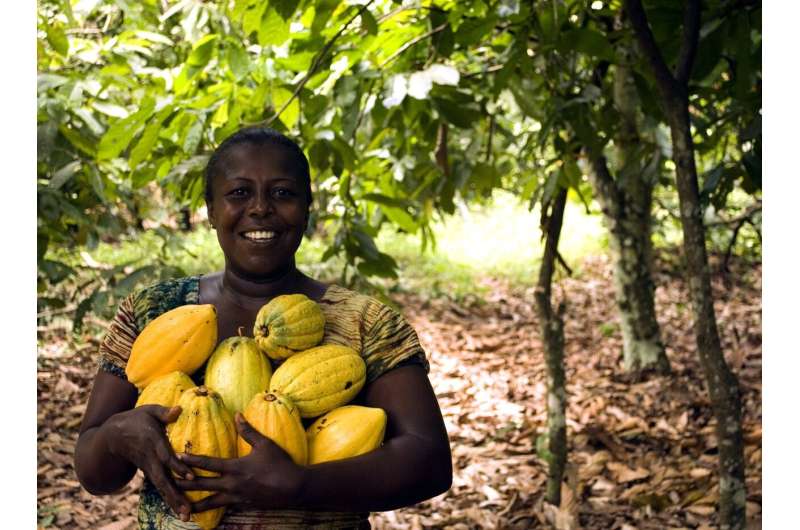Climate adaptation increases vulnerability of cocoa farmers, study shows

New research offers an alternative perspective on adaptation to climate threats in Southeast Asia.
Sean Kennedy, a professor of urban and regional planning at the University of Illinois Urbana-Champaign, looked at the ways that small cocoa farmers in Indonesia are adapting to threats from climate change, including prolonged drought. He found that corporations are shaping the behavior of small farmers, fixing their labor in place in a way that alleviates the corporations’ economic displacement but increases the vulnerability of the farmers. He reported his research findings in an article in Annals of the American Association of Geographers.
Recent trends in the Indonesian cocoa sector offer a lens to examine the politics of displacement in the context of socioeconomic and climatic change, Kennedy said. Climate change can result in various forms of displacement, but the consequences of efforts designed to minimize displacement haven’t received the same attention, he said.
The farmers in the region he studied are all smallholder producers, with at least 1 million families engaged in cocoa farming. Cocoa productivity has rapidly declined due to climate change, pests and poor soil health, as well as consumer demands for sustainable cocoa necessitating increased investment in its production. A growing number of smallholders have abandoned cocoa production.
Often the goal of climate adaptation is to allow people to stay in place—for instance, building a sea wall to protect against flooding, managing wildfires or increasing a crop’s productivity in response to drought, Kennedy said. However, the cocoa farmers historically have been highly mobile, moving to seek supplemental income from nonagricultural jobs and in response to seasonal variations and climatic disruptions. They also could choose to grow other commodity crops, he said.
But chocolate manufacturers needed farmers to stay in place and continue to produce cocoa beans. Kennedy examined the efforts of Mars Inc. to manage climate-related supply chain risks.
“Like other chocolate manufacturers, for Mars, the combined impact of climate-related productivity declines, increased demand for certified chocolate and the growing unwillingness of smallholder producers to engage in cocoa cultivation have resulted in significant supply threats,” Kennedy wrote.
“‘Climate-smart cocoa’ aims to transform and reorient farming systems to decrease greenhouse gas emissions, boost adaptive capacity and improve productivity while supporting incomes.”
The corporation’s strategies included standardization of farming practices and creation of financial dependencies. Mars created training programs that focus on techniques to increase production, including the use of fertilizers and pesticides. Through purchase agreements, cocoa producers were required to participate in training; buy plant stock, fertilizers and pesticides through Mars; and sell their beans to the corporation, bypassing the local traders that in the past had provided supplies and financing arrangements and bought the beans. Credit was provided through microfinance arrangements that used the farmers’ land as collateral.
The result, Kennedy said, is that farmers are beholden financially to the corporation, which dictates production practices. They cannot abandon cocoa production to grow other commodity crops or pursue a different source of income because their assets are tied up in those arrangements.
“When some entity is saying, “Here’s a climate-adaptation program intended to keep people in place,” often staying in place is not the best way to adapt to climate change. People have been adapting to climatic variation for a long time in ways that often involved moving around,” Kennedy said. “Mars has avoided being displaced economically, but it is transferring the risks it faced onto others. Outreach programs that are framed as benefiting small producers are actually benefiting corporate producers, rather than the people on farms growing cocoa.”
The research shows that climate adaptation is not limited to smallholder farmers and their environments, but is part of the global economic landscape, and that corporate sustainability efforts are actually a transfer of risk from the corporations to the producers, Kennedy wrote.
A cocoa bean’s ‘fingerprint’ could help trace chocolate bars back to their farm of origin, finds a new study
Sean F. Kennedy, The Power to Stay: Climate, Cocoa, and the Politics of Displacement, Annals of the American Association of Geographers (2021). DOI: 10.1080/24694452.2021.1978839
Citation:
Climate adaptation increases vulnerability of cocoa farmers, study shows (2022, January 13)
retrieved 13 January 2022
from https://phys.org/news/2022-01-climate-vulnerability-cocoa-farmers.html
This document is subject to copyright. Apart from any fair dealing for the purpose of private study or research, no
part may be reproduced without the written permission. The content is provided for information purposes only.
For all the latest Science News Click Here
For the latest news and updates, follow us on Google News.

